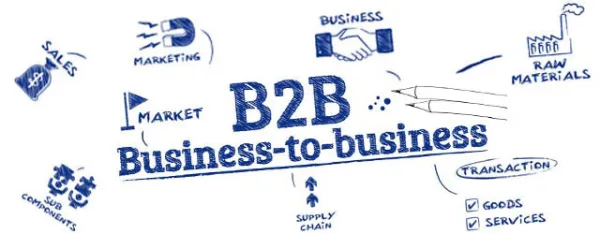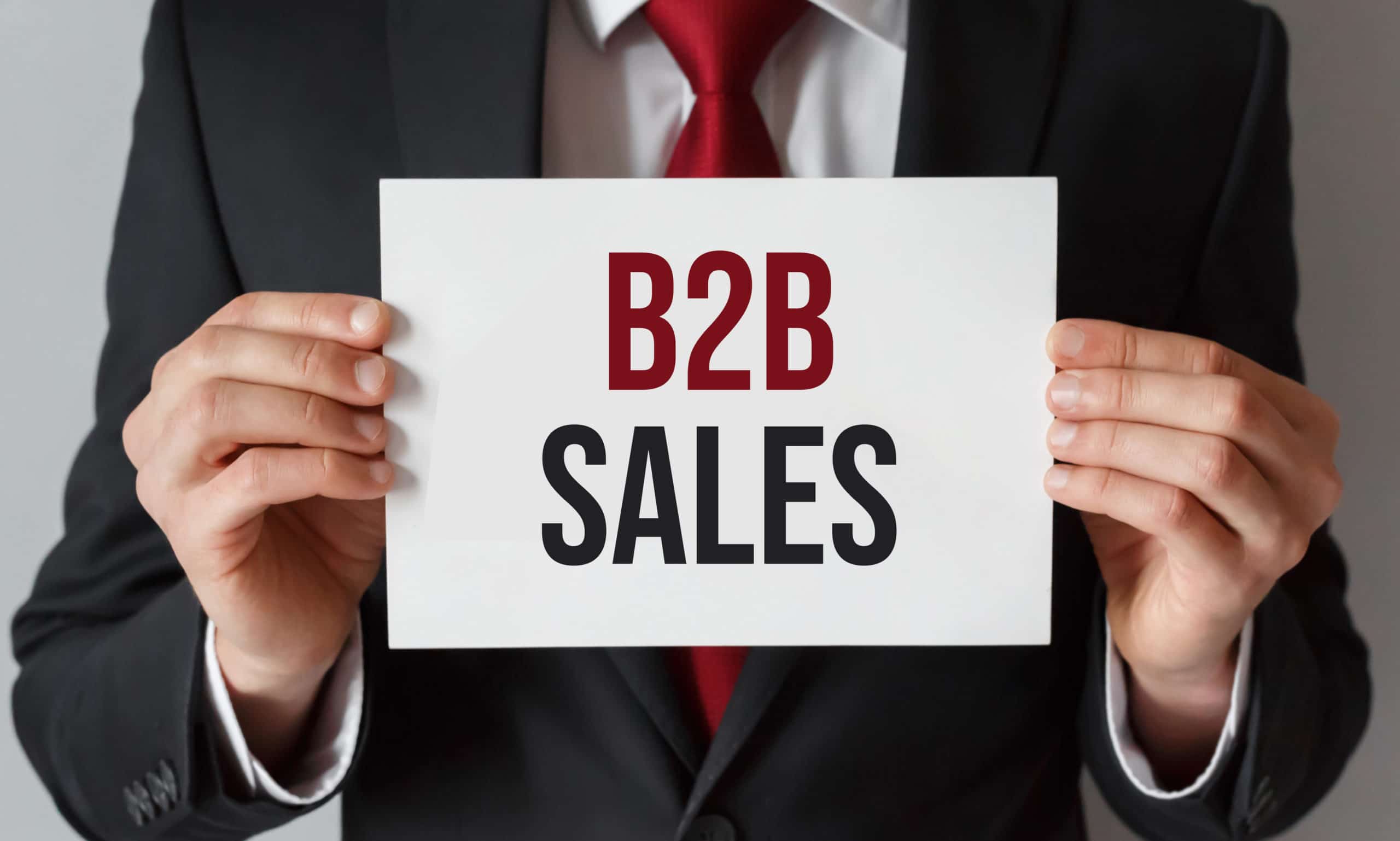What Is B2B Sales? Essential Skills to Become a B2B Salesperson
Learn about the concept of B2B sales, the characteristics of B2B customers, and effective sales strategies. Also, get detailed insights into the necessary skills, how to build relationships, and use technology to optimize the B2B sales process.

1. What is B2B Sales?
B2B (Business-to-Business) sales is the process of selling products or services from one business to another. Unlike B2C (Business-to-Consumer) sales, B2B focuses on building long-term relationships and meeting specific business needs. The B2B sales process is often complex, requiring specialized skills such as a deep understanding of the product, negotiation and persuasion skills, and the ability to manage and analyze customer data to optimize business efficiency.

2. Some Characteristics of B2B Customers
B2B (Business-to-Business) customers typically have a more complex purchasing process than B2C customers. Their purchasing decisions often involve multiple stakeholders and are based on a detailed analysis of business benefits and efficiency. B2B customers seek long-term solutions and want to build sustainable relationships with suppliers. They prioritize reliability, product/service quality, and continuous technical support. Their needs are often highly specialized and require customization to fit their business operations.

B2B corporate customers usually have a low purchasing frequency but a very large volume and scale of purchases. Their purchasing decisions are often prolonged and highly professional, with many people involved in the decision-making process. They prioritize building long-term relationships with suppliers and are particularly concerned with pricing issues.
3. Comparison and Distinction Between B2B and B2C
Criteria | B2B (Business-to-Business) | B2C (Business-to-Consumer) |
Target Customers | Organizations, businesses | Individual consumers |
Marketing Process | Focuses on long-term relationships, seminars, direct marketing | Mass advertising, social media, broad campaigns |
Sales Process | Complex, multi-stage, multi-level approvals | Simple, quick decision-making |
Sales Cycle | Long, from several months to several years | Short, from a few minutes to a few days |
Negotiation and Transactions | Complex, multi-party involvement, detailed contracts | Simple, little negotiation, direct purchase |
Order Value | Large, high volume and value | Smaller, low volume and value |
After-Sales Service | Deep technical support, continuous service | Less complex, mainly warranty and customer support |
Purchasing Decision | Rational, careful consideration of economic benefits and performance | Emotional, based on personal preferences and immediate needs |
Customer Relationship | Long-term, continuous trust and satisfaction | Short-term, immediate shopping experience |
Product Complexity | Complex, requires explanation and customization | Simple, easy to understand and use |
Pricing Strategy | Flexible, with a specific pricing policy, negotiable | Fixed, little negotiation, listed price |
The table above compares the differences between B2B and B2C based on various criteria, helping to provide a clearer understanding of the characteristics and processes of these two business types.
4. What a B2B Salesperson Needs to Do
As mentioned above, the two customer groups, B2C and B2B, differ in their characteristics and behavior, so the work of a B2B salesperson is also different from a B2C salesperson.
Here is a list of tasks that a B2B corporate sales representative needs to perform:
- Approach potential customers through online and offline channels.
- Research and analyze the market and competitors.
- Establish and maintain relationships with customers.
- Advise, introduce, and quote products and services to customers.
- Draft, negotiate, and sign business contracts.
- Represent the company at events and exhibitions.
- Receive orders, coordinate delivery, payments, and debt collection.
- Support customers during the shipping and product usage process.
- Evaluate the effectiveness of the sales strategy.
- Prepare sales reports for management.
- Participate in training sessions and improve sales skills.
- Analyze sales data to propose new strategies.
- Seek new business opportunities and expand the customer network.
- Collaborate closely with other departments to ensure customer satisfaction.
- Monitor and forecast market trends to adjust sales strategies accordingly.

5. Essential Skills for a B2B Salesperson
- Establish and maintain relationships: Create a good personal rapport through effective communication and building trust.
- Product comparison: Compare your company's products and services with competitors to identify your strengths.
- Customer segmentation: Use data to segment customers and focus on the groups whose needs match your strengths.
- Customer research: Thoroughly research customers, especially the decision-maker.
- Prepare presentation content: Prepare detailed information to answer all questions and address any negative perceptions about the company.
- Follow-up and support: Continue to follow up and resolve issues after meeting with customers to secure a contract.
- Add value with extra services: If your product is not significantly different from competitors, offer additional services like extended warranties and returns to create a unique selling proposition.

6. Techniques to Apply in the B2B Sales Process
The B2B sales process requires professionalism and thorough preparation to meet the specific needs of B2B corporate customers. Some important techniques for this process are:
- Research and understand the customer: Thoroughly understand the customer's industry, scale, and needs to provide a suitable solution.
- Build relationships: Create and maintain good relationships with customers through regular communication and continuous technical support.
- Present value: Focus on the value that the product/service brings to the customer's business, rather than just presenting features.
- Negotiate and persuade: Negotiation and persuasion skills are extremely important for reaching a mutually beneficial agreement.
- Time and project management: Track and manage time to ensure commitments and projects are completed on schedule.
- Use CRM tools: Use customer relationship management tools to track, analyze, and optimize the sales process.

7. B2B Sales Tips to Improve Sales Performance
The performance of B2B sales can be improved if B2B salespeople apply some of these tips:
- Personalize customer communication: Use technology to personalize communication on a large scale.
- Continuous training: B2B buyers prefer to engage with professionals who demonstrate expertise and empathy.
- Build genuine relationships: Actively listen, think critically, ask the right questions, and use a multi-channel approach.
- Form a support team: Consider having a dedicated sales support team.
- Embrace new technology: Use sales engagement platforms and data to make smarter decisions.
- Showcase positive feedback: Encourage and showcase customer success stories.
- Strategic alignment: Ensure alignment between marketing, sales, and customer success teams.
- Research prospects: Learn about the customer's industry and needs.
- Deeply understand the product/service: Provide accurate and persuasive advice.
- Focus on value: Emphasize the value the product brings.
- Use data and CRM tools: Manage customer information effectively.
- Create impressive presentations: Use real-world data and specific examples.
- Be adaptable and flexible: Adjust your strategy based on feedback.
- Post-sales care: Support customers to ensure satisfaction and maintain the relationship.

8. Salary of a B2B Salesperson
The salary of a B2B sales representative depends on their competence, experience, and work performance. Specifically, their income is composed of a base salary, KPI-based commission, allowances, and other benefits. The average base salary for a B2B salesperson ranges from 5 to 10 million VND per month, with experienced professionals potentially reaching 12 to 15 million VND per month. Total income can range from 20 to 50 million VND per month, including commission and other allowances. This salary is relatively attractive and heavily dependent on the individual's effort and ability.
- Base salary: 5 - 15 million VND/month.
- KPI-based commission: Plays a major role in total income.
- Total income: 20 - 50 million VND/month.
- Dependent on: Competence, experience, and personal effort.
Overall, the B2B sales job offers an attractive income, motivating employees to continuously improve their skills and work performance.
9. Conclusion
B2B salespeople play a crucial role in connecting businesses, requiring many specialized skills and thorough preparation. By establishing personal relationships, deeply understanding the product and customer, comparing with competitors, and offering extra services, they can create great value for the company. Continuous training and embracing new technology are also essential factors for improving sales effectiveness. With the right preparation and skills, B2B salespeople can achieve success and attractive income.
Furthermore, businesses can join the online B2B connection platform at GMAJOR to seek potential partners, expand their business network, and optimize sales efficiency. This platform provides opportunities for connection, exchange, and collaboration between businesses, contributing to sustainable and effective development for all participants.